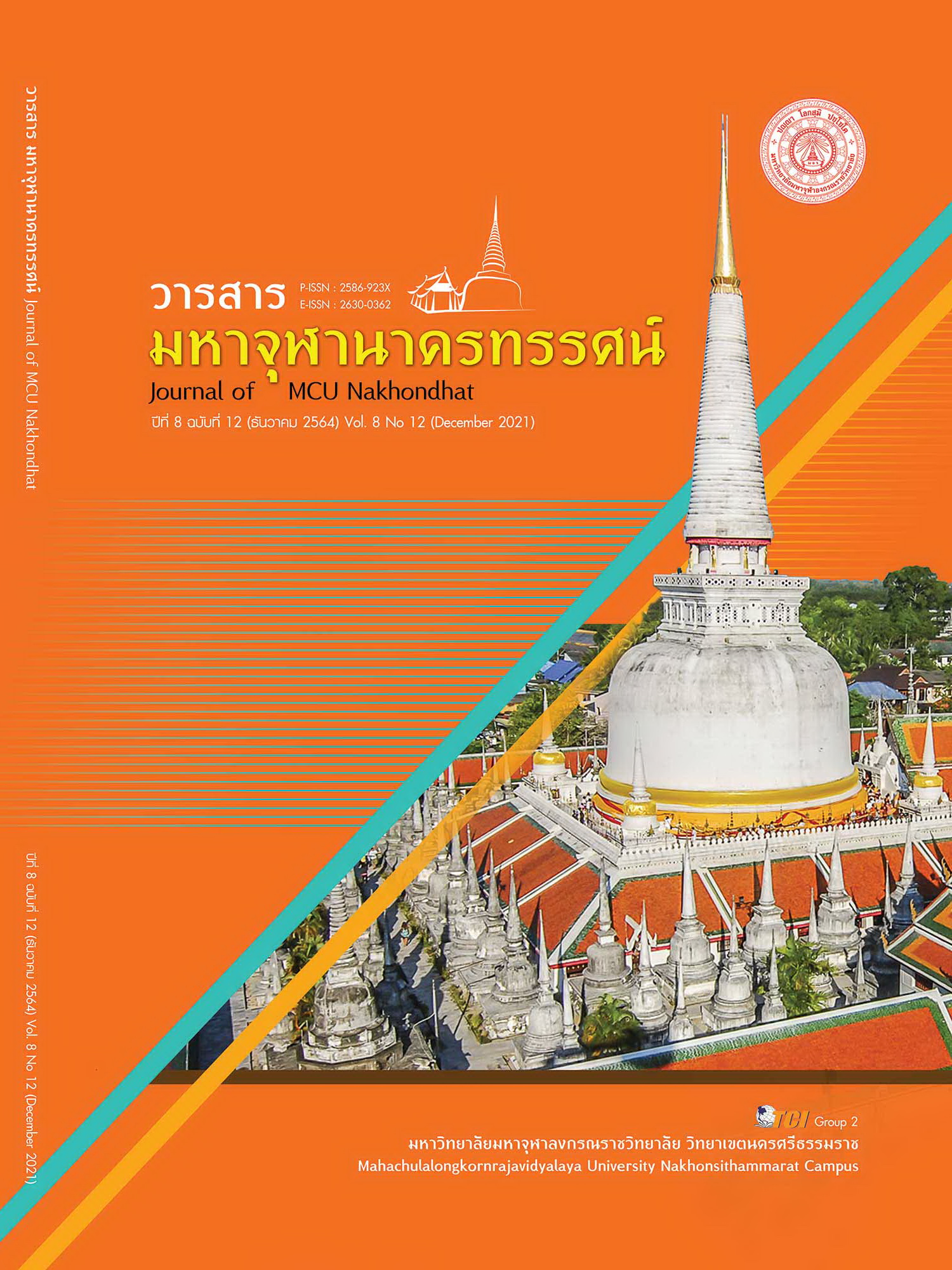SIMULATED FAMILY: BONDING FROM UNIVERSITY TO COMMUNITY
Main Article Content
Abstract
This article aims to explain extracurricular activities: simulated family in phase I among nursing students in the university. This is knowledge integration to the community, and aim to holistic student development who be good, smart, happiness, and humanized health care person. Then, this author was asking their opinion from students and members of the simulated family about this activity and participating in this activity with review literature. The result was the students have expectations from this activity, such as good relationship, love and warm as well as real family, caring and advice to simulated family and community. This was consistent with the expectations of the simulated family on outcomes of extracurricular activities that wanted to have their offspring studying nursing. They carry on love and warmth to students as they were real family members who want to receive care and health advice. According to basis of family in Thai society with love, warm, friendship, stability and safety which defining expected attributes, role and simulated family's activities. However, the finding about a process supplementary curriculum activity with simulated family, did not follow the concept of simulated family. These include a conversational aesthetics, reflection thinking in daily life, systematic thinking and problem-solving skills which is the process of developing the service mind with humanized health care
Article Details
References
กรมกิจการสตรีและสถาบันครอบครัว. (2563). นิยามและประเภทครอบครัว. เรียกใช้เมื่อ 30 สิงหาคม 2564 จาก https://www.opsmoac.go.th/chachoengsao-action_plan-files-431091791793
จุรี แสนสุข และคณะ. (2559). การศึกษาแบบบูรณาการโดยใช้ระบบครอบครัวเสมือนต่อความคงทนของอัตลักษณ์ จิตบริการด้วยหัวใจความเป็นมนุษย์ในบัณฑิตโครงการผลิตพยาบาลชุมชน เพื่อชุมชน ของชุมชนและโดยชุมชน จังหวัดขอนแก่น. วารสารการพยาบาลและการดูแลสุขภาพ, 34(3), 140-146.
นิระมล สมตัว และคณะ. (2562). การเรียนรู้บูรณาการกิจกรรมเสริมหลักสูตร (ระบบครอบครัวเสมือน)เพื่อส่งเสริมทักษะการคิดและการแก้ปัญหาอย่างสร้างสรรค์ของนักศึกษาพยาบาล. วารสารวิจัยและพัฒนาหลักสูตร, 9(2), 344-361.
ประเสริฐ อัตโตหิ และคณะ. (2561). รูปแบบการจัดการศึกษาอย่างมีส่วนร่วมโดยใช้ระบบครอบครัวเสมือน เพื่อสร้างอัตลักษณ์จิตบริการด้วยหัวใจความเป็นมนุษย์วิทยาลัยการแพทย์แผนไทยอภัยภูเบศร จังหวัดปราจีนบุรี สถาบันพระบรมราชชนก. วารสารพยาบาลกระทรวงสาธารณสุข, 28(1), 139-151.
ปัทมา ทองสม และคณะ. (2563). กระบวนการพัฒนาอัตลักษณ์บัณฑิตของวิทยาลัยในสังกัดสถาบันพระบรมราชชนก กระทรวงสาธารณสุข. วารสารวิชาการสาธารณสุข, 29(3), 547-560.
มกราพันธุ์ จูฑะรสก และคณะ. (2564). ผลของการพัฒนากระบวนการเรียนรู้จิตบริการด้วยหัวใจความเป็นมนุษย์ภายใต้ระบบครอบครัวเสมือนที่มีต่อทักษะระบวนการคิดอย่างเป็นระบบเชิงสร้างสรรค์ด้วยเทคนิคตะกร้า 3 ใบ ของบุคลากรด้านสุขภาพ. วารสารวิจัยและพัฒนาหลักสูตร, 11(1), 49-70.
ราชบัณฑิตยสถาน. (2556). พจนานุกรมฉบับราชบัณฑิตยสถาน พ.ศ.2554. กรุงเทพมหานคร : นานมีบุคส์พับลิเคชั่นส์.
ลิลลี่ ศิริพร และคณะ. (2557). รูปแบบการจัดการศึกษาแบบบูรณาการกระบวนการคิดอย่างเป็นระบบ และจิตบริการด้วยหัวใจความเป็นมนุษย์ในสังคมพหุวัฒนธรรม สถาบันพระบรมราชชนก. วารสารการพยาบาลและการศึกษา, 7(1), 39-54.
วราพร วันไชยธนวงค์ และคณะ. (2560). การพัฒนาและขับเคลื่อนธรรมนูญสุขภาพ วิทยาลัยพยาบาลบรมราชชนนี เชียงใหม่. วารสารสมาคมพยาบาลแห่งประเทศไทยฯ สาขาภาคเหนือ, 23(1), 43-53.
สมควร หาญพัฒนชัยกูร และคณะ. (2557). การพัฒนาชุมชนสุขภาวะโดยใช้นวัตกรรมระบบครอบครัวเสมือน (หนึ่งวิทยาลัย หนึ่งชุมชน). วารสารพยาบาลกระทรวงสาธารณสุข, 24(1), 67-79.
อุไรรัชต์ บุญแท้ และคณะ. (2560). สภาวะสุขภาพและคุณภาพชีวิตของผู้สูงอายุ ภายใต้การดูแลของเครือข่ายชุมชนร่วมกับครอบครัวเสมือน. วารสารการพยาบาลและการดูแลสุขภาพ, 35(3), 175-185.
Boulding, K. E. (1959). National images and international systems. Journal of conflict resolution, 3(2), 120-131.
Health Resources & Services Administration. (2017). Definition of Family. Retrieved august 30, 2021, from https://www.hrsa.gov/get-health-care/affordable/hill-burton/family.html
Intawong, K. et al. (2021). Application technology to fight the COVID-19 pandemic: Lessons learned in Thailand. Biochemical and biophysical research communications, 534, 830-836.
Qian, M., & Jiang, J. (2020). COVID-19 and social distancing. Journal of Public Health, 2020-25,1-3.
Scammell, J. et al. . (2012). Humanising values at the heart of nurse education. Nursing times, 108(41), 26-28.
Tsimane, T. A., & Downing, C. (2020). Transformative learning in nursing education: a concept analysis. International journal of nursing sciences, 7(1), 91-98.
United Nations. (2017). Principles and Recommendations for Population and Housing Censuses: Revision 3. Revision 3. New York: New York United Nations.
White, S. et al. (2018). The personal tutor as a role model for students: humanising nursing care. British Journal of Nursing, 27(1), 52-55.


